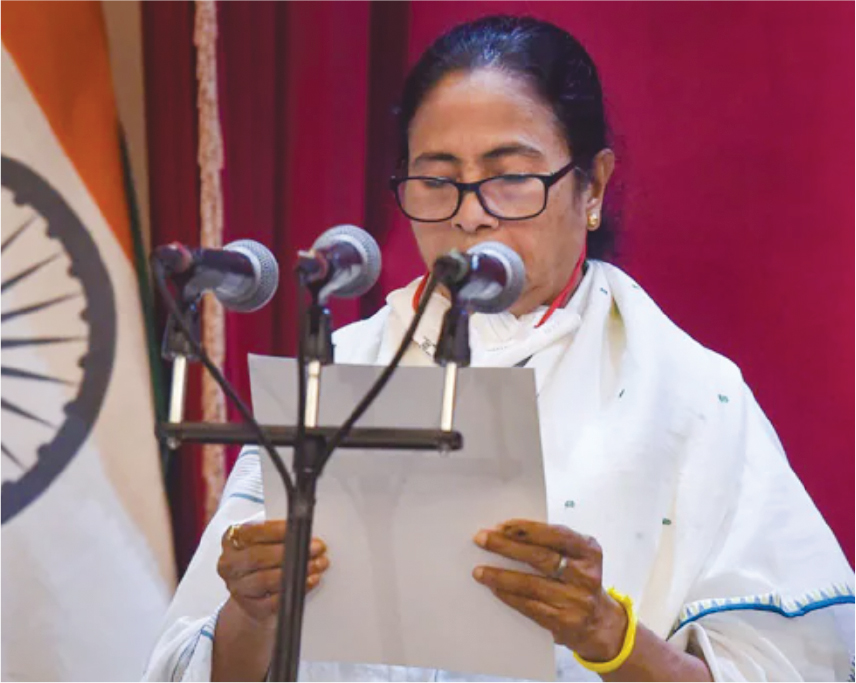– Baishali Mukherjee (Kolkata)
 West Bengal’s unprecedented eight-phase legislative assembly election ended on May 2 with a thumping third-time victory for the Trinamool Congress (TMC) and incumbent chief minister Mamata Banerjee, not necessarily in that order. Not only did the dream of the BJP led by star campaigners — prime minister Narendra Modi and Union home minister Amit Shah — of winning more than 200 of the 294 seats in the legislative assembly vanish in smoke, Banerjee’s TMC was swept back into office with 214 seats, three more than in 2016.
West Bengal’s unprecedented eight-phase legislative assembly election ended on May 2 with a thumping third-time victory for the Trinamool Congress (TMC) and incumbent chief minister Mamata Banerjee, not necessarily in that order. Not only did the dream of the BJP led by star campaigners — prime minister Narendra Modi and Union home minister Amit Shah — of winning more than 200 of the 294 seats in the legislative assembly vanish in smoke, Banerjee’s TMC was swept back into office with 214 seats, three more than in 2016.
This historic election was controversially held even as the Covid-19 pandemic was running riot statewide. On April 24, West Bengal (pop.91 million) reported 14,281 new Covid-19 cases and 59 deaths of which 20 were reported in Kolkata. Notably two TMC and one Congress candidate succumbed to the deadly virus while campaigning before the Election Commission — which has come in for scathing criticism from the judiciary — banned all mass rallies from April 12 onward.
Amidst this chaos, public school education in the state has been hard hit. Though schools were partially reopened from February 12, the second pandemic wave of April has forced their shutdown again. On April 19, education minister Partha Chatterjee directed all government and government aided schools to close from April 20, bringing the summer vacation forward a month ahead of schedule. Thus far, the state government has not cancelled classes X and XII school-leaving exams of government schools. Now that the assembly election is over and Covid positive cases and fatalities are plateauing, they may be held in July, just before the start of the new academic year.
Meanwhile, the pan-India CBSE and CISCE exam boards have cancelled their class X and postponed class XII exams. Even if not for law and order — widespread post-poll violence in the state has raised the shadow of President’s rule over West Bengal — Banerjee’s return to power in Writers Building, Kolkata augurs relatively well for the education sector.
During her previous terms in office, the TMC government made a discernible effort to bring about the promised poribartan (change) in K-12 and higher education with several initiatives. The most successful among them is the Kanyashree scheme introduced in 2013, which provided adolescent girl children in the 13-19 age group three-tier scholarships of Rs.500 per year for continuing their education, a one[1]time payment of Rs.25,000 at age 18 and full tuition waiver for pursuing postgraduate college education.
Initiatives in primary education include measures taken to ensure regular attendance of teachers in the state’s 92,000 government schools; opposing the no-detention (s.16) provision of the RTE Act, 2009 and inaugurating 100 English-medium government primaries in 19 districts of the state. Moreover, in the run-up to the legislative assembly election, Banerjee announced an array of schemes and recruitment drives in the education sector including transfer of Rs.10,000 to the bank accounts of 950,000 class XII students enrolled in 14,000 government and government-aided schools and 636 madrasas for buying smart phones or tablets, and distribution of 2.5 million bicycles among classes IX-XII students.
In higher education as well, considerable changes have been introduced during her two previous terms in office. The number of universities in the state has increased from 12 in 2011 to 40 with student enrolment in higher education doubling from 1.3 million in 2010-11 to 2 million in 2017-18. Moreover, the TMC government took a strong stand against rising student indiscipline on college and university campuses.
On December 2, 2019, education minister Partha Chatterjee ruled out any concession for several thousands of college students disqualified from writing their first semester exams because of inadequate attendance. Although students protested stridently laying siege to colleges and blocking arterial roads, for the first time, the TMC government didn’t buckle under pressure.
According to political pundits in Kolkata, Banerjee’s sustained effort to reform the state’s once much vaunted education system ruined during 34 years of uninterrupted rule (1977-2011) of the CPM (Communist Party of India-Marxist)-led Left Front over the state, has impressed West Bengal’s influential bhadralok (refined middle class) which places a high premium on high-quality holistic education. Moreover Banerjee’s spirited response to the Hindu, Hindi, Hindustan rhetoric of the BJP, promoting Bengali pride and exceptionalism, and secular pro-minorities campaign enabled her to halt the BJP juggernaut in West Bengal.
Yet perhaps the best result of the recently concluded raucous assembly election of 2021 is that the CPM which misruled West Bengal for 34 years with a Marxist iron hand, didn’t win a single seat.
Somewhat belatedly, the citizenry of West Bengal — India’s most academically and industrially advanced state until the early 1970s — has become aware of the damage and devastation that the CPM and its cadres inflicted upon this high potential state.
Also read: West Bengal: Education trump card



























